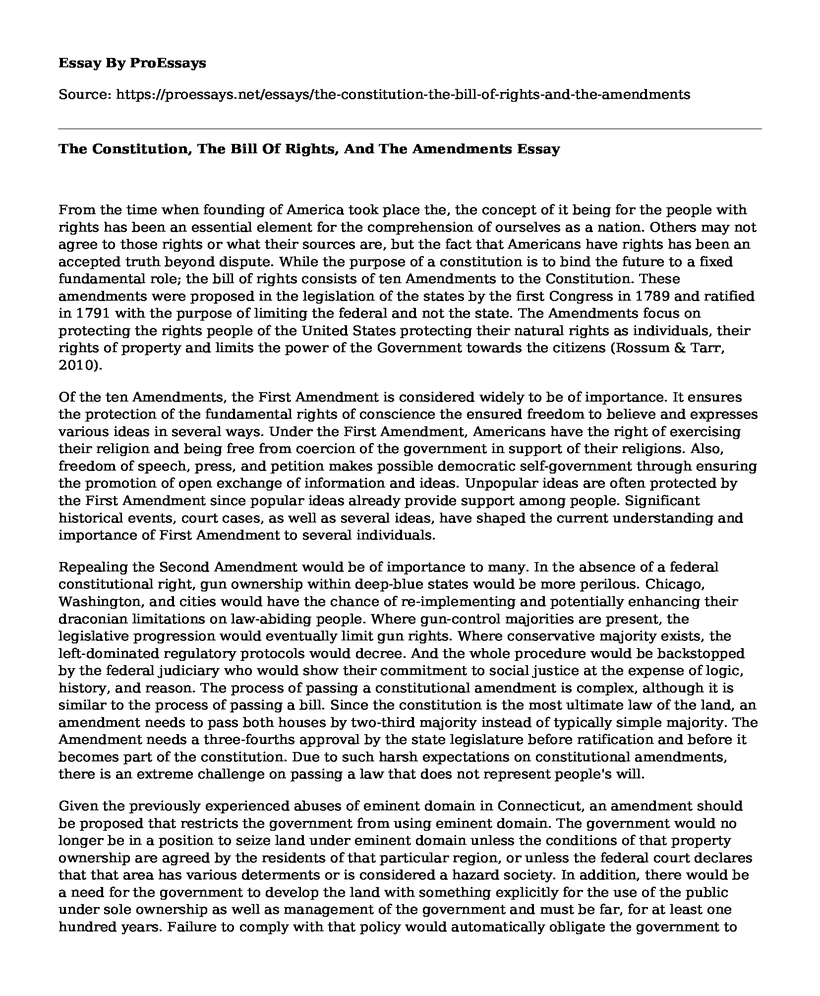From the time when founding of America took place the, the concept of it being for the people with rights has been an essential element for the comprehension of ourselves as a nation. Others may not agree to those rights or what their sources are, but the fact that Americans have rights has been an accepted truth beyond dispute. While the purpose of a constitution is to bind the future to a fixed fundamental role; the bill of rights consists of ten Amendments to the Constitution. These amendments were proposed in the legislation of the states by the first Congress in 1789 and ratified in 1791 with the purpose of limiting the federal and not the state. The Amendments focus on protecting the rights people of the United States protecting their natural rights as individuals, their rights of property and limits the power of the Government towards the citizens (Rossum & Tarr, 2010).
Of the ten Amendments, the First Amendment is considered widely to be of importance. It ensures the protection of the fundamental rights of conscience the ensured freedom to believe and expresses various ideas in several ways. Under the First Amendment, Americans have the right of exercising their religion and being free from coercion of the government in support of their religions. Also, freedom of speech, press, and petition makes possible democratic self-government through ensuring the promotion of open exchange of information and ideas. Unpopular ideas are often protected by the First Amendment since popular ideas already provide support among people. Significant historical events, court cases, as well as several ideas, have shaped the current understanding and importance of First Amendment to several individuals.
Repealing the Second Amendment would be of importance to many. In the absence of a federal constitutional right, gun ownership within deep-blue states would be more perilous. Chicago, Washington, and cities would have the chance of re-implementing and potentially enhancing their draconian limitations on law-abiding people. Where gun-control majorities are present, the legislative progression would eventually limit gun rights. Where conservative majority exists, the left-dominated regulatory protocols would decree. And the whole procedure would be backstopped by the federal judiciary who would show their commitment to social justice at the expense of logic, history, and reason. The process of passing a constitutional amendment is complex, although it is similar to the process of passing a bill. Since the constitution is the most ultimate law of the land, an amendment needs to pass both houses by two-third majority instead of typically simple majority. The Amendment needs a three-fourths approval by the state legislature before ratification and before it becomes part of the constitution. Due to such harsh expectations on constitutional amendments, there is an extreme challenge on passing a law that does not represent people's will.
Given the previously experienced abuses of eminent domain in Connecticut, an amendment should be proposed that restricts the government from using eminent domain. The government would no longer be in a position to seize land under eminent domain unless the conditions of that property ownership are agreed by the residents of that particular region, or unless the federal court declares that that area has various determents or is considered a hazard society. In addition, there would be a need for the government to develop the land with something explicitly for the use of the public under sole ownership as well as management of the government and must be far, for at least one hundred years. Failure to comply with that policy would automatically obligate the government to confiscate back the land to its original owners or the descendants. In case no one is found, then the land should be reverted to the original use and auctioned off. Perhaps through ensuring restrictions on the use of eminent domain, prevention of future greed on land grabbers are secured, and they are prevented from stealing away land from homeowners with the court left powerless to prevent the innocent.
In a nutshell, the ten Amendments that were proposed to the legislation of the states by the first Congress in 1789, protects the rights people of the United States but also limits the governments power towards the citizens. The First Amendment, in the second paragraph, gives people right of exercising their religion and freedom of speech as well as press and petition. Therefore, living without it would be almost impossible because people always have their opinions towards some actions that they have to express and that government needs to consider. Repealing the Second Amendments as discussed in the third paragraph, would be of importance mainly because of the previous events that have unfolded due to gun possession. However, passing such a constitutional amendment would require needs a three-fourths approval by the state legislature before ratification, the process is complex, and a challenge is experienced when passing a law that does not represent the will of the people. Lastly, seize land under eminent domain by the government should be an additional amendment to the Constitution because it would bring the benefit of ensuring restrictions on the use of eminent domain and prevent future greed of land grabbers.
References
Rossum, R. A., & Tarr, G. A. (2010). American Constitutional Law, Volume 2: The Bill of Rights and Subsequent Amendments. Westview Press.
Cite this page
The Constitution, The Bill Of Rights, And The Amendments. (2021, Mar 22). Retrieved from https://proessays.net/essays/the-constitution-the-bill-of-rights-and-the-amendments
If you are the original author of this essay and no longer wish to have it published on the ProEssays website, please click below to request its removal:
- A Claim of Policy: Electric Cars Essay
- Compare and Contrast Essay Sample on Italian Identity and African American Identity
- The Corrupt Bargain Essay Example
- The Death Penalty in the US Research
- Canada: An Education Superpower - Essay Sample
- Essay Example on Healthcare Risk Management: Maximizing Quality & Compliance
- Free Paper Sample: HIV/AIDS Cases in Nigeria







